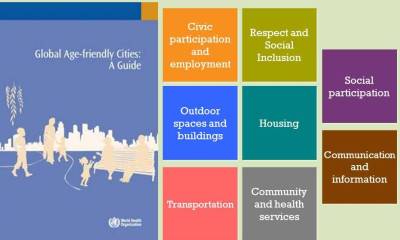2nd WHO Consultation on Developing Age-friendly City Indicators, 8 September 2013, Québec City, Canada

The WHO Centre for Health Development (WKC) conducted the 2nd Consultation on Developing Age-friendly City Indicators on 8 September, 2013 in Québec City, Canada. This consultation is part of a series of consultations, started in 2012, organized by WKC in an effort to develop new technical guidance on monitoring the “age-friendliness” of cities. The objective of this consultation was to obtain expert opinion on how to advance the development of an age-friendly city monitoring framework and core indicator set. The consultation was held as a pre-conference meeting to the 2nd International Conference on Age Friendly Cities (9-11 September 2013, Quebec, Canada).
Fourteen international experts and seven WHO officers, representing five of the WHO regions, gathered for this one-day meeting. The main inputs for discussion were a draft monitoring framework and the preliminary results from a pilot study. Twenty cities from seven countries had so far participated in the pilot study which involved an evaluation of 61 indicators considered critical for monitoring age-friendliness of cities through previous consultation with officials and experts. The indicators were ranked by value scores assigned by local health officials and community representatives participating in the pilot study, and a short list of high-ranking indicators was constructed. During the meeting, the experts engaged in group work to provide specific feedback on the framework, the short-listed candidates for the core indicators and their proposed definitions.
The outcomes of the meeting suggest possible modifications to the structural and visual aspects of the framework, a narrower set of core indicators, and the development of an assessment tool that would help users apply the framework and core indicators to their own local context. Additional inputs will be sought before finalizing these products through further consultations with relevant experts as well as with local health officials and community representatives in Member States.
If you are interested in engaging in future consultations, please contact WHO Kobe Centre.

